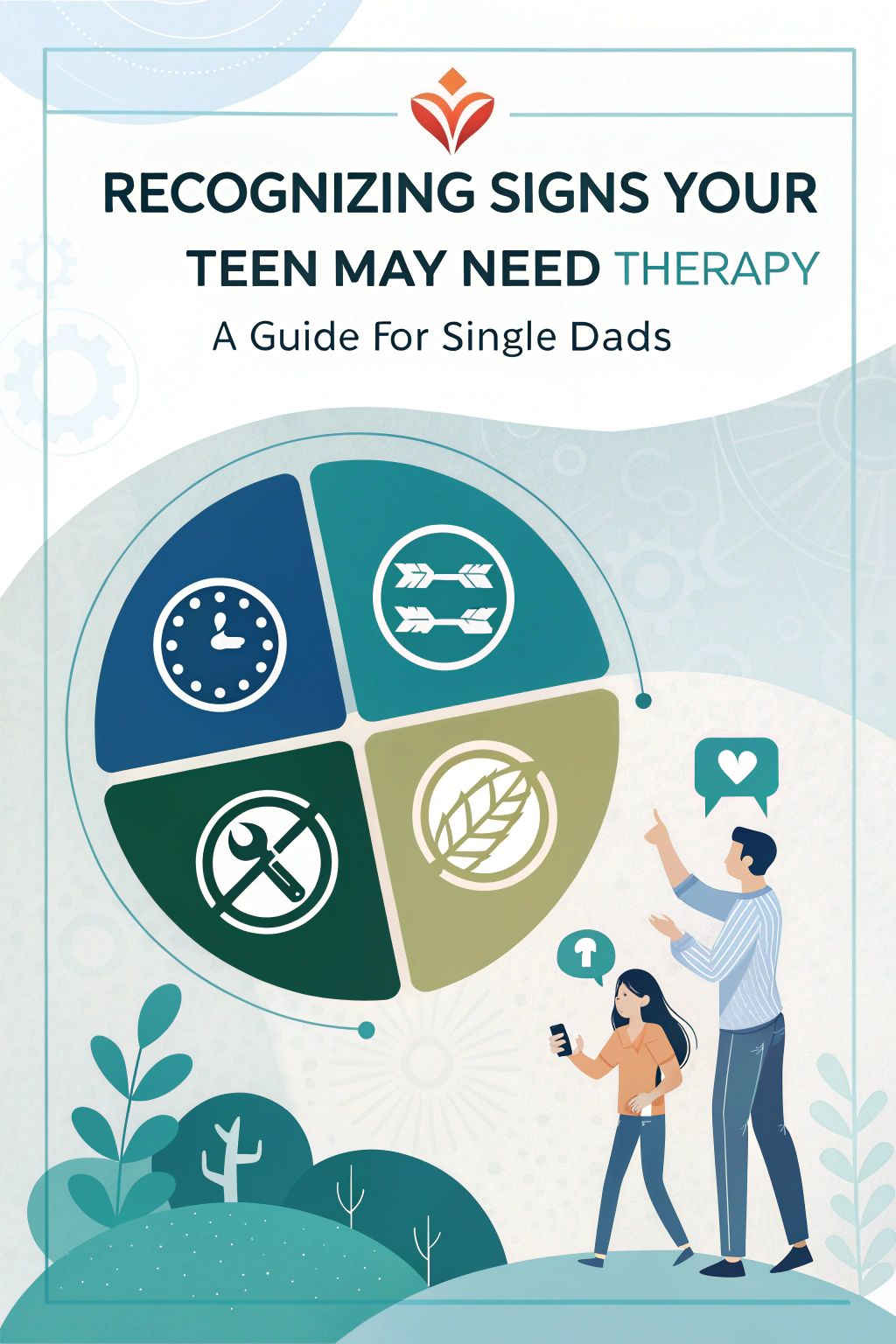Recognizing Signs Your Teen May Need Therapy: A Guide For Single Dads
Parenting a teenager can feel overwhelming, especially for single dads. Teens often face mental health issues like depression or anxiety that are hard to spot. This guide will help you recognize signs your teen may need therapy and show how to support them.
Keep reading to learn more.
Key Takeaways
- Persistent mood swings, withdrawal from family, or a sudden drop in grades can signal your teen needs therapy. Look for signs like emotional outbursts or loss of interest in hobbies.
- Teens may use drugs, alcohol, or self-harm to cope with stress, anxiety, or trauma. Early intervention can prevent long-term harm.
- Single dads often struggle to find mental health resources or fear stigma. Therapy should be framed as a supportive tool, not a punishment.
- Choose a therapist who specializes in teen mental health and suits your teen’s preference for in-person or online sessions. A good rapport is key.
- Encourage regular therapy attendance and be patient with progress. Support your teen’s emotional well-being without pressure or judgment.

Recognizing Signs Your Teen May Need Therapy
Teens often show clear signals when they’re struggling, like sudden shifts in behavior or emotions. Paying attention to these changes can help you spot when they might need extra support, like therapy.
Persistent mood swings or emotional outbursts
Persistent mood swings in teenagers can signal deeper emotional issues. Emotional outbursts may appear suddenly, lasting longer than typical teenage behavior. These intense reactions can stem from stress, anxiety disorders, or underlying mental health problems.
Parents often notice such changes during conversations or daily activities. Teens might struggle to control their emotions, leading to frequent conflicts at home. Recognizing these patterns early can help address potential mental health concerns.
Mood swings linked to sadness or anger may require professional support. A mental health professional can assess whether these behaviors point to affective disorders. Therapy sessions, like cognitive behavioral therapy, offer effective coping strategies.
Open communication with your teen about their feelings can also ease emotional distress.
Withdrawal from family, friends, or activities
Teens pulling away from family, friends, or hobbies can signal deeper issues. They might avoid conversations, skip group outings, or lose interest in activities they once loved. This behavior often links to low self-esteem, social anxiety, or emotional health struggles.
Pay attention if they isolate themselves often, especially after a traumatic event or grief. A sharp decline in social skills or empathy toward others can also be a red flag. Single dads should note these changes and consider child therapy or talk therapy as supportive options.
Building emotional resilience takes time, and professional help can make a difference.
Decline in academic performance or interest in school
A sudden drop in your teen’s grades can signal deeper issues. If they lose interest in school, it might point to stress, anxiety, or even bullying. Pay attention if they skip homework or seem disengaged during classes.
Changes like these often reflect emotional struggles that need professional support.
Sleep deprivation and screen time can also play a role in this decline. Mental health disorders like ADHD or depression may impact their ability to focus and perform academically. Early intervention through counseling or therapy can help address the root cause of their struggles.
Use of drugs or alcohol
Teens using drugs or alcohol can show clear warning signs. Watch for changes in behavior, like secretive actions or new friends. They may lose interest in hobbies or schoolwork. Physical signs include bloodshot eyes, sudden weight changes, or slurred speech.
Emotional shifts, like mood swings or irritability, often occur. Teens might also self-medicate to cope with stress or anxiety. Substance abuse can lead to risky behaviors, impacting their mental health.
Early intervention is crucial. Look for addiction treatment options if you notice these patterns. Open communication helps teens feel supported. Encourage them to share their struggles without fear of judgment.
Therapy, like cognitive behavioral therapy, can address underlying issues. Addressing substance abuse early can prevent long-term harm and improve their well-being.
Experiencing panic attacks or heightened anxiety
Panic attacks and heightened anxiety can be alarming for both teens and parents. Your teen might feel a sudden, intense fear, often with physical symptoms like a racing heart, sweating, or trouble breathing.
Anxiety can show up as constant worry or fear about everyday.
Difficulty coping with trauma, grief, or loss
Teens struggling with trauma, grief, or loss often show clear signs of distress. They may feel anxious, avoid talking about the event, or seem emotionally numb. Some teens experience insomnia or changes in appetite as they process their feelings.
Others might turn to cutting, self-harming behaviors, or even suicidal thoughts when emotions become overwhelming.
Recognizing these signs early is crucial for single dads. A clinical psychologist or mental health counselor can help your teen develop healthy coping mechanisms like cognitive behavioral therapy (CBT) or art therapy.
Tools such as relaxation techniques and motivational interviewing offer practical ways to manage intense emotions during adolescent development. Addressing these issues promptly reduces long-term risks like posttraumatic stress disorder (PTSD).

Common Barriers Single Dads Face in Seeking Help
Single dads often struggle to tell normal teen behavior apart from warning signs of deeper issues. Many also feel unsure about where to find reliable mental health support for their teens.
Misinterpreting normal teenage behavior
Single dads often confuse typical teenage rebellion with deeper issues. Mood swings, irritability, or a desire for more independence can seem alarming. These actions might just be part of normal behavior during adolescence.
Teens naturally test boundaries, question authority, and seek their identity. The amygdala, the brain’s emotion center, is still developing, leading to impulsive decisions. Recognizing this helps dads avoid overreacting to everyday teenage behavior.
Understanding the difference matters. A teen’s withdrawal might stem from smartphone addiction, not necessarily depression. Attention-seeking actions, like dramatic outbursts, could be their way of coping with stress.
Paying attention to patterns helps. If a teen’s behavior changes suddenly or worsens over time, it might signal a deeper issue. Professional guidance from a child psychologist can clarify what’s normal and what’s not.
Single dads should stay observant but avoid jumping to conclusions too quickly.
Lack of awareness about mental health resources
Single dads often struggle to find mental health resources for their teens. Many aren’t familiar with local services, like counseling centers or online therapy options. Adolescents facing issues such as anxiety, grief, or self-harm need specialized care.
Resources like play therapy or suicide prevention programs can make a difference. Schools and community groups often offer free help but are rarely advertised. Dr. Adekemi Oguntala, also known as TheTeenDoc, highlights the importance of early support for teens in San Mateo and beyond.
Knowing where to look can ease the stress of finding the right therapist for your child.
Fear of stigma or judgment
Many single dads hesitate to seek therapy for their teens due to fear of stigma or judgment. Society often attaches labels to mental health care, making parents worry about how others will perceive their family.
Teens may also feel embarrassed, thinking they’ll be judged by peers or seen as “weak.” This fear can create barriers, leaving issues like self-harm or anxiety unaddressed.
Open communication helps break these inhibitions. Framing therapy as a tool for strength and growth shifts the narrative. By normalizing conversations about mental health, single dads can show empathy while reducing shame around seeking help from therapists.
Addressing stigma early ensures teens get the support they need without unnecessary judgment.

How to Approach Your Teen About Therapy
Start by choosing a calm moment to talk, and let your teen know you’re there to listen, not judge. Use simple, honest words to explain therapy as a helpful tool, not something to fear.
Create a safe and open environment
Building a safe and open environment starts with setting aside distractions. Choose a quiet time to talk, and ensure your teen feels heard. Keep the atmosphere calm, and avoid interrupting or judging their words.
Use empathetic language, and show genuine interest in their feelings. Let them know their emotions are valid, and you’re there to support them, not criticize. Teens often struggle with expressing themselves, so patience is key.
Encourage honesty by sharing your own experiences when appropriate. Make it clear therapy isn’t a punishment, but a way to help them feel better. Small gestures, like regular check-ins, can strengthen trust over time.
Focus on their feelings and concerns
Create a safe environment for your teen to express their emotions. Listen without interrupting or judging them. Ask open-ended questions like, “How does that make you feel?” or “What’s been on your mind lately?” This shows you care about their concerns and want to understand their perspective.
Avoid dismissing their feelings, even if they seem small to you. Let them know it’s okay to feel upset, anxious, angry, or confused. Acknowledge their struggles without trying to fix everything right away.
If they mention specific issues like friends, school stress, or harmful behavior patterns, let them guide the conversation based on what’s important in their experience at the moment rather than introducing topics yourself.
Instead, gently encourage sharing over time with patience as trust gradually develops between both parties. Keep things simple but meaningful, focusing on supporting emotional well-being as the priority.
Take one step at a time, consistently showing genuine interest every day, no matter how busy life outside the home may be. This approach truly matters, especially during these formative years, which are full of challenges and opportunities.
Addressing them thoughtfully can lead to healthier and happier outcomes in the long term. By showing mutual respect, understanding, and compassion during ongoing conversations, parents and teens can build a stronger bond, prepared to tackle whatever lies ahead with confidence, reassurance, and unconditional support.
Frame therapy positively as a tool for support
Therapy helps teens manage their emotions and build resilience. Avoid calling it a fix for being “broken.” Instead, explain how it’s like having a coach for handling stress or tough feelings.
Teens often feel overwhelmed by school, friendships, or family changes. Therapy offers them tools to navigate these challenges in healthy ways.
Focus on the practical benefits of therapy. It can improve communication skills and help with issues like anxiety or grief. Let your teen know it’s okay to ask for support when life feels heavy Encourage them to see therapy as a safe space to talk openly without judgment Point out that seeking help shows strength, not weakness.

Choosing the Right Therapist for Your Teen
Finding the right therapist for your teen means choosing someone skilled in teen mental health, ensuring they feel comfortable, and matching their preferences for in-person or online sessions; learn more to make the best choice.
Look for specialists in adolescent mental health
Teens face unique psychological challenges, and finding the right therapist can make a big difference. Look for professionals who focus on adolescent mental health, as they understand issues like self-harm, anxiety, or drug use better than general therapists.
Specialists often have training in areas like trauma, autism, or eating disorders, which can be crucial if your teen struggles with these specific concerns. They also know how to connect with teens during challenging phases, helping them open up about their feelings.
Consider asking potential therapists about their experience with teenage girls or boys since gender-specific issues might arise. A good fit ensures your teen feels heard and supported through therapy sessions.
Check if the therapist offers options like in-person or online sessions based on your teen’s comfort level. Teens may prefer one format over the other depending on their needs or schedule.
Pay attention to how well the therapist builds rapport with your child during initial meetings, as trust is key to effective therapy. If your teen has experienced grief or loss due to events like divorce or death of a loved one find someone skilled in handling such situations Single dads should feel confident picking a specialist who aligns with both practical needs emotional support requirements.
Consider their preferences for in-person or online sessions
Single dads should ask their teens if they prefer in-person or online therapy sessions. Some teens feel more comfortable talking at home, while others might prefer the structure of an office setting.
Online sessions can be convenient for busy schedules, especially with school or extracurricular activities. In-person therapy might work better for teens who need a space away from distractions.
Pay attention to their comfort level, as it can impact their willingness to open up. Communication tips can help you understand their preferences without pressure. Whether it’s grief, anxiety, or other concerns, the right format can make therapy more effective.
Ensure the therapist has a good rapport with your teen
A strong connection between your teen and their therapist is crucial. Teens are more likely to open up if they feel comfortable and understood during sessions. Look for a therapist who specializes in adolescent mental health, as they often have the skills to build trust quickly.
Pay attention to how your teen reacts after the first few meetings. Positive feedback or a willingness to return are good signs. Therapy works better when your teen feels safe and respected.
Consistency in attendance often improves when they connect well with the therapist. Focus on finding someone who listens without judgment and offers practical support. If your teen feels heard, they’re more likely to engage in the process and make progress.

Supporting Your Teen Through the Process
Encourage your teen to attend therapy sessions regularly, showing that you value their commitment. Be patient with their progress, offering support without pressure, and listen to their experiences with care.
Encourage consistent attendance
Consistent attendance in therapy sessions helps teens build trust with their therapist. It creates a routine that supports emotional stability and progress over time. Single dads should prioritize scheduling around school and extracurricular activities to minimize conflicts.
Teens may resist initially, but regular sessions can lead to breakthroughs in issues like grieving or self-injury. Open communication about the benefits of therapy eases resistance.
Setting reminders or using calendars ensures sessions aren’t missed, even during busy weeks. A supportive approach, without pressure, makes the process less overwhelming for both teens and single parents.
Be patient and understanding of their progress
Teen therapy takes time, and progress isn’t always straightforward. Your teen may have good days and bad days, which is normal. Be patient, and avoid pushing them to share more than they’re ready for.
Understanding their pace shows you respect their process.
Single fathers can help by offering encouragement without pressure. Focus on small wins, like improved sleep patterns or fewer emotional outbursts. Your patience builds trust and helps them feel supported.
This personal involvement can strengthen your bond while addressing issues like alcohol abuse or self-harm.
Conclusion
Parenting a teen is tough, especially as a single dad. Recognize the signs early, and take action. Therapy can be an effective resource for your teen’s mental health. Stay supportive, ask for help, and know—you’re not alone in this journey.
Your dedication can make all the difference.
FAQs
1. What are some signs my teen may need therapy?
If your teen has self-harmed, shown changes in appetitea, or expressed thoughts about teen suicide, these could be serious reasons to seek help.
2. Can violent video games indicate a need for therapy?
While playing violent video games alone isn’t a sign, if paired with aggressive behavior or mood swings, it might suggest deeper issues worth exploring.
3. How does binge drinking relate to mental health in teens?
Binge drinking can signal emotional struggles or stress in teens, making it one of the reasons to consider professional support like therapy.
4. Who is Dr. Adekemi “Dr. O” Oguntala and how can she help?
Dr. Adekemi “Dr.O” Oguntala is an expert who provides guidance on recognizing when teens may benefit from therapy based on their behaviors and emotions.
5.What should I do if I notice warning signs in my teen?
Start by talking openly with your teen about their feelings and consult a professional like Dr.Oguntala for advice tailored to your situation .

Dr. O “TheTeenDoc.” helps clinicians communicate better with their teen patients. She speaks, blogs www.TheTeenDoc.com, researches and consults on communicating with teens. She has written two e-books for parents and teens on communicating about the challenging subject of sexual health. You know, teens that bring chief complaints of belly pain, social crisis, emotional turmoil and obnoxious parents. Or, is it the parents with obnoxious teens? Sometimes she mixes that complaint up.
Dr. O speaks www.TheTeenDoc.com to and is consulted by clinicians who want advice managing difficult teen and teen-parent situations. These situations frustrate clinicians and slow down their clinics making them wonder if they’ll ever walk out the door for the day. Every day, in her own practice, Dr. O helps clinicians communicate better with teens and helping you is another level of reward. Her talks are fun and informative, and her delivery empowers clinicians to actually think teens are an awesome group to work with. Her energy about teens is contagious and has inspired her coaching clients to have less fear and more confidence with the teens in their panel. Her dedication to seeing you succeed with a group she is so passionate about is what makes Dr. O’s Lounge the place you want to be!
If you are a clinician that has teen’s in your practice, from pediatrics to internal medicine, the person with whom you need to connect is Dr. O “TheTeenDoc!” You can listen to a complimentary audio “The Art of Teen Medicine” and recommend her e-book “Are You Serious? It’s Just Sex!” to your patients. And while you’re there, become part of Dr.O’s Lounge.
Specialties: consulting, coaching, counseling, mental health, research, seminars, spanish, public speaker, teaching, communications between teens and adults



